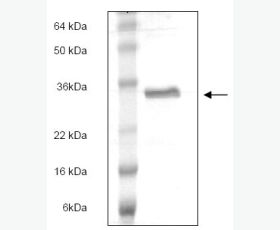Recombinant Human PDCD4/H731
| Product name: | Recombinant Human PDCD4/H731 |
| Source: | E. coli |
| Purity: | Greater than 95% as determined by reducing SDS-PAGE. |
| Buffer Formulation: | Lyophilized from a 0.2 μm filtered solution of 20mM PB,150mM NaCl,pH7.4. |
| Applications: | Applications:SDS-PAGE; WB; ELISA; IP. |
| Storage: | Avoid repeated freeze/thaw cycles. Store at 2-8 oC for one month. Aliquot and store at -80 oC for 12 months. |
| UOM: | 100ug/50ug/200ug/1mg/1g |
| Source | E. coli |
| Description | Recombinant Human Programmed Cell Death Protein 4 is produced by our E.coli expression system and the target gene encoding Lys212-Pro357 is expressed with a 6His tag at the C-terminus. |
| Names | Programmed Cell Death Protein 4, Neoplastic Transformation Inhibitor Protein, Nuclear Antigen H731-Like, Protein 197/15a, PDCD4, H731 |
| Accession # | Q53EL6 |
| Formulation | Lyophilized from a 0.2 μm filtered solution of 20mM PB,150mM NaCl,pH7.4. |
| Shipping |
The product is shipped at ambient temperature. |
| Reconstitution |
Always centrifuge tubes before opening. Do not mix by vortex or pipetting. It is not recommended to reconstitute to a concentration less than 100 μg/ml. Dissolve the lyophilized protein in ddH2O. Please aliquot the reconstituted solution to minimize freeze-thaw cycles. |
| Storage |
Lyophilized protein should be stored at < -20°C, though stable at room temperature for 3 weeks. Reconstituted protein solution can be stored at 4-7°C for 2-7 days. Aliquots of reconstituted samples are stable at < -20°C for 3 months. |
| Purity |
Greater than 95% as determined by reducing SDS-PAGE. |
| Endotoxin | Less than 0.1 ng/µg (1 IEU/µg) as determined by LAL test. |
| Amino Acid Sequence |
MKASHREMTSKLLSDLCGTVMSTTDVEKSFDKLLKDLPELALDTPRAPQLVGQFIARAVGDGILC NTYIDSYKGTVDCVQARAALDKATVLLSMSKGGKRKDSVWGSGGGQQSVNHLVKEIDMLLKEYLL SGDISEAEHCLKELEVPLEHHHHHH
|
| Background | Programmed Cell Death Protein 4 (PDCD4) is a member of the PDCD4 family. PDCD4 and EIF4A1 form a heterotrimer. One molecule of PDCD4 binds two molecules of EIF4A1. PDCD4 takes part in apoptosis via inhibiting translation initiation and cap-dependent translation.PDCD4 promotes colonic neoplastic transformation and tumor invasion. PDCD4 is an important target for microrna R-21 in breast cancer cells. Shortage of PDCD4 expression is associated with colorectal cancer. Overexpression of PDCD4 in carcinoid cells results in inhibition of cell proliferation. |














